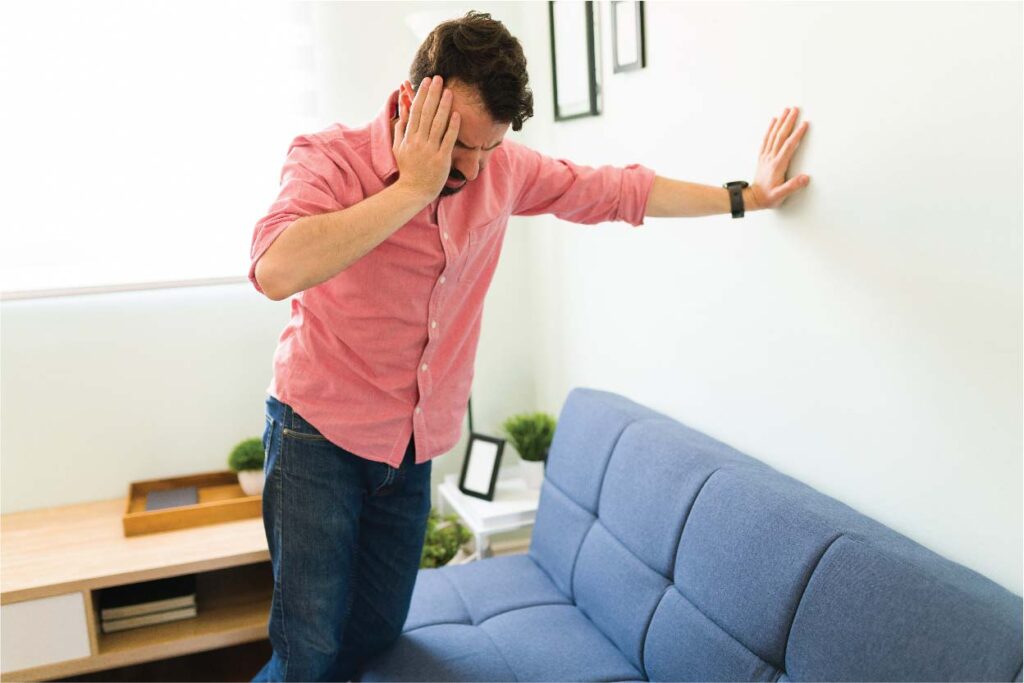Struggling with Balance? Get a Hearing Exam

Contrary to popular belief, hearing loss isn’t all about just hearing the world around you. There are so many other health issues that can be connected to hearing loss. Balance is one of these things that you might not even consider, at least at first. The truth is balance and hearing loss are very closely connected.
The labyrinth is the part of your ear responsible for balance. The cochlea is where the all-important “hearing nerve” resides. These two parts are located in the same place, therefore when one is not working right, the other often follows suit. This is why your doctor will suggest a hearing exam when you complain about your loss of balance.
So, what can you do about your recent falls, or close call falls? Should you just assume it has something to do with hearing loss? Where do you even start?
Balance Issues Explained
Loss of balance can feel like dizziness, a spinning room, a strange floating sensation, vision changes, and feeling very unsteady as you try to walk. These feelings may hit you when you stand up and move around but they can also affect you while you’re just lying in bed or sitting in your favorite chair.
Balance problems don’t just happen to the seasoned population either. Younger adults and even kids can experience the same loss of balance symptoms as older adults. The reasons for it may be different, but many times, the symptoms can be very similar.
While your loss of balance and constant dizziness could be due to something as simple as an ear infection or motion sickness, it can also be caused by something more serious, for example:
- Migraines
- Meniere’s disease
- Benign paroxysmal positional vertigo (BPPV)
- Vestibular neuritis
- Acoustic neuroma
- Hearing loss
These are only a few of the conditions that could be causing your balance problems. It’s important to talk to your doctor about the symptoms you’re experiencing to rule out any serious issues. Don’t be too surprised when they refer you to an audiologist or hearing specialist though. As we’ve discussed, balance conditions and hearing loss are very closely related.
Hearing Loss and Balance Issues After an Injury
Did you know that your sense of balance and hearing takes place deep in the inner ear? With both these vital parts (the labyrinth and cochlea) that take care of our balance and hearing located so close to each other, just imagine if you were in an accident or experienced a hit that injured that area. You might find yourself having problems with dizziness and hearing loss as well. Now you know why!
Balance Tests
Your doctor will most likely recommend that you go through a few tests to find out more about what could be causing your balance issues. Most tests are simple and non-invasive but are extremely helpful for your doctor to determine what’s really going on.
Some of these tests may include:
- Hearing tests
- Rotary chair test (looking at your eye movements)
- Posturography test (measures the part of your balance system you use most)
- Dix-Hallpike maneuver (checking your sense of motion)
- Vestibular evoked myogenic potentials test (measure tiny muscle contractions in your neck, forehead and under your eyes to see how they react to sound)
- Electronystagmography and videonystagmography (analyzing eye movements)
- Radiology imaging tests (MRI & CT)
- Blood pressure checks
Could it be Tied to Hearing Loss?
Many people don’t even realize that they are gradually losing they’re hearing. In fact, those around you might be the first ones to tell you that they have noticed a change. Ask yourself some of the following questions:
- Are you always asking people to repeat themselves when they’re talking to you?
- Do you have a hard time having a conversation on the phone?
- Are you experiencing a ringing sound in your ears?
- Does it seem like no one is speaking clearly anymore and always seem to be mumbling?
- Do people tell you that when you watch TV it’s always turned up too loud?
- When you’re in a noisy restaurant or other noisy place is it increasingly difficult for you to understand what people are saying?
- Do you have a hard time following a conversation in general?
What Treatments are Available?
While the link between balance and hearing is still being researched and we are constantly learning new information there are treatments that have been shown to have great success. Your treatment will depend on what is causing your hearing loss and dizziness. Treatments may include antibiotics if there is an infection, corticosteroids, physical therapy, hearing aids, new eyeglass prescription, a host of different medications (again depending on the cause), and more.
Unfortunately, most hearing loss is not reversible but treating your hearing loss early can slow down its progress. Ear infections that have caused temporary hearing loss, however, can be treated with antibiotics, restoring your hearing in a matter of days. No matter what, you should never wait to seek out help for your hearing loss.
We are Here to Help
Visiting a hearing specialist is many times one of the last things that we make time for. Many people think that their hearing loss will just come back after a while or that the dizziness and lack of balance that they are experiencing will only last for a time. Taking care of your hearing loss and finding out what is really going on and how you can treat it or minimize the effects will help you achieve overall better health and wellness.
If you or someone that you love has been experiencing hearing loss or are finding a lack of balance is a part of your daily life, it’s time to make an appointment with one of our experienced hearing specialists located at Fairfax Hearing Center. We want to be an important part of your team that helps you find a solution that will not only have you hearing better but regaining your balance so that you can live the life you enjoy. Contact your new hearing and balance team to schedule a consultation today.

